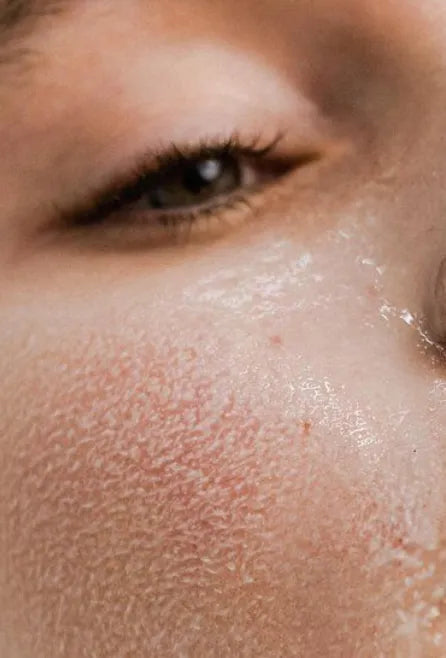It’s 2 a.m., and you’re awake again. Your pyjamas are damp, your sheets feel like a furnace, and no amount of flipping the pillow to the cool side seems to help. Sound familiar? If you’re dealing with menopause, this may be an all-too-common scenario.
Night sweats don’t just wake you up—they leave you feeling exhausted, frustrated, and helpless against yet another sleepless night. But there are ways to cool down, relax, and get the rest your body so desperately needs. From creating a cooling sleep environment to sipping on an all-natural adaptogenic sleep tea like The Calming Herbata, small changes can make a big difference.
Why Do Night Sweats Happen During Menopause?
Night sweats are a common symptom of menopause, driven by the hormonal changes your body is navigating.
1. Declining Oestrogen Levels
Oestrogen plays a key role in regulating your body’s internal thermostat. When levels drop, your hypothalamus—the part of the brain responsible for temperature control—overreacts to minor changes, triggering intense heat surges and excessive sweating.
2. Increased Heat Sensitivity
As your body becomes more sensitive during menopause, even a slightly warm room can intensify the discomfort of night sweats.
3. Elevated Cortisol Levels
Stress and hormonal fluctuations can lead to spikes in cortisol, the “stress hormone,” which exacerbates night sweats and makes it harder to relax and fall asleep.
How Night Sweats Impact Sleep
Night sweats don’t just wake you up—they disrupt your entire sleep cycle, preventing your body from reaching the deeper stages of restorative sleep. This leads to:
-
Fatigue: A lack of quality sleep leaves you feeling sluggish and unproductive.
-
Restlessness: The physical discomfort of sweating makes it hard to settle back into a comfortable position.
-
Emotional Toll: Repeated disruptions can create a cycle of anxiety, making you dread going to bed in the first place.
How to Cool Down and Manage Night Sweats
1. Sip on a Natural Sleep Remedy
A calming tea, like The Calming Herbata, can help regulate your body’s stress response and promote relaxation, making it easier to sleep through the night.
Key ingredients include:
-
Oat Straw: A gentle adaptogen that calms the nervous system and reduces stress.
-
Lavender: Known for its ability to lower anxiety and support deep sleep.
-
Chamomile: A traditional remedy for restlessness and sleeplessness.
-
Passionflower and Lemon Balm: These herbs stabilise mood and help your body manage the hormonal changes triggering night sweats.
This herbal sleep tea works naturally to soothe both body and mind, making it an ideal addition to your nightly routine.
2. Create a Cooling Sleep Environment
-
Set your thermostat between 16–18°C (60–65°F).
-
Use lightweight, breathable bedding made from cotton or linen to wick away moisture.
-
Invest in cooling pillows or a mattress pad to help regulate your temperature throughout the night.
3. Balance Hormones with Diet and Exercise
-
Phytoestrogen-Rich Foods: Include flaxseeds, soy, and lentils in your diet to mimic oestrogen and reduce hot flash intensity.
-
Stay Active: Gentle exercises, like yoga or walking, support hormonal balance and reduce stress.
4. Manage Stress Levels
Stress can worsen night sweats, so lowering cortisol before bedtime is key. Pair mindfulness practices, like meditation or journaling, with a warm cup of herbal sleep remedy to help you unwind.
Why an All-Natural Sleep Tea Can Help
An all-natural adaptogenic sleep tea offers a gentle alternative to synthetic sleep aids. By calming the nervous system and supporting hormonal balance, teas like The Calming Herbata help address the root causes of menopause insomnia while promoting deep, uninterrupted sleep.
A Simple Nighttime Routine for Cooling Relief
-
Prepare Your Space: Lower the temperature in your bedroom and choose breathable bedding to stay cool.
-
Enjoy a Soothing Tea: Brew a cup of The Calming Herbata 30 minutes before bed. The herbs will help ease tension and promote relaxation.
-
Practice Mindful Relaxation: Pair your tea with gentle stretching, deep breathing, or a calming playlist to help you unwind.
Take Control of Night Sweats Naturally
Night sweats don’t have to control your nights. With a few small changes—like creating a cool sleep environment and enjoying a hormone-supportive herbal sleep remedy—you can reduce their impact and wake up feeling refreshed.
Because every woman deserves restful, rejuvenating sleep—even during menopause.
References
-
National Institutes of Health: Hormonal Triggers of Night Sweats (https://pubmed.ncbi.nlm.nih.gov/19707017/)
-
Journal of Herbal Medicine: Chamomile and Lavender for Better Sleep (https://pubmed.ncbi.nlm.nih.gov/32066548/)
-
Journal of Sleep Research: Managing Menopause Insomnia with Natural Remedies (https://pubmed.ncbi.nlm.nih.gov/29281225/)
HORMONAL & PROUD
Created as a brand to help women navigate the toughest moments in pregnancy, childbirth, postpartum — and practically every stage of life –– The SABI aims to change the narrative around our hormones from one of taboo, embarrassment, and loneliness to awareness and pride. As more than a wellness brand, The SABI offers a carefully-crafted line of products to carry you through your hormonal journey, including rituals, supportive tools, and ancient herbal remedies that have been tested time and time again by women and now come backed by medicine. The SABI is a blend of science and nature conceived by women who have experienced the joys and deep struggles of bringing a child into the world, the pains of a heavy, difficult period, miscarriage, and difficulty conceiving.
We offer you an invitation to get to know your body and its cycles better –– an invitation to really understand what is going on inside. Learn to use your hormonal cycle to your advantage no matter your stage of life, and know that you can support and balance your hormone levels. Look for the right sources of information. Know that there is help, and know that you’re supported.
DISCLAIMER
The SABI blog and articles are not meant to instruct or advise on medical or health conditions, but to inform. The information and opinions presented here do not substitute professional medical advice or consultations with healthcare professionals for your unique situation.
















